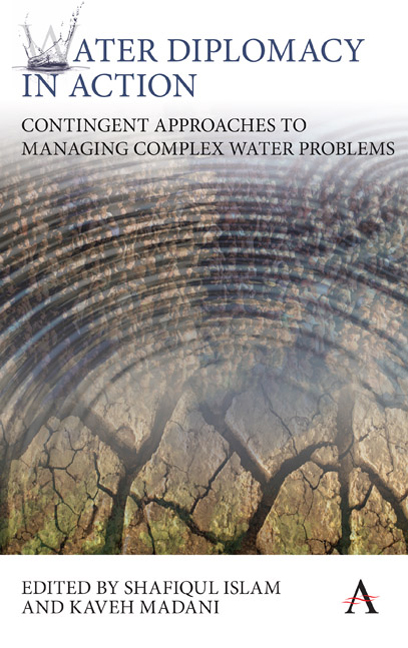Book contents
- Frontmatter
- Contents
- List of Figures
- List of Tables
- The Blind Men, the Elephant and the Well: A Parable for Complexity and Contingency
- Preface
- Part I ROOTS AND CAUSES OF COMPLEXITY AND CONTINGENCY IN WATER PROBLEMS
- Part II TOOLS, TECHNIQUES, MODELS AND ANALYSES TO RESOLVE COMPLEX WATER PROBLEMS
- Part III CASE STUDIES
- Chapter Ten The Nature of Enabling Conditions of Transboundary Water Management: Learning from the Negotiation of the Indus and Jordan Basin Treaties
- Chapter Eleven Mediation in the Israeli– Palestinian Water Conflict: A Practitioner's View
- Chapter Twelve Risk Distribution and the Adoption of Flexibility: Desalination Expansion in Qatar
- Chapter Thirteen The Grand Ethiopian Renaissance Dam: Conflict and Water Diplomacy in the Nile Basin
- Chapter Fourteen Engaging Stakeholders for Water Diplomacy: Lessons for Integrated Water Resources Management
- Chapter Fifteen Strategic Insights for California's Delta Conflict
- Notes on Contributors
- Index
Chapter Twelve - Risk Distribution and the Adoption of Flexibility: Desalination Expansion in Qatar
from Part III - CASE STUDIES
Published online by Cambridge University Press: 10 January 2018
- Frontmatter
- Contents
- List of Figures
- List of Tables
- The Blind Men, the Elephant and the Well: A Parable for Complexity and Contingency
- Preface
- Part I ROOTS AND CAUSES OF COMPLEXITY AND CONTINGENCY IN WATER PROBLEMS
- Part II TOOLS, TECHNIQUES, MODELS AND ANALYSES TO RESOLVE COMPLEX WATER PROBLEMS
- Part III CASE STUDIES
- Chapter Ten The Nature of Enabling Conditions of Transboundary Water Management: Learning from the Negotiation of the Indus and Jordan Basin Treaties
- Chapter Eleven Mediation in the Israeli– Palestinian Water Conflict: A Practitioner's View
- Chapter Twelve Risk Distribution and the Adoption of Flexibility: Desalination Expansion in Qatar
- Chapter Thirteen The Grand Ethiopian Renaissance Dam: Conflict and Water Diplomacy in the Nile Basin
- Chapter Fourteen Engaging Stakeholders for Water Diplomacy: Lessons for Integrated Water Resources Management
- Chapter Fifteen Strategic Insights for California's Delta Conflict
- Notes on Contributors
- Index
Summary
Abstract
Future needs for urban water supply are often highly uncertain, especially in cities with rapid, variable population growth. Technological innovations and volatility in energy prices aggravate the risks of investments in water infrastructure systems. In such uncertain conditions, Flexible Design can significantly increase expected performance compared to conventional designs, as Chapter 6 in this book demonstrates. Flexible Design achieves this result by embedding Real Options in the design and using them to adjust the system performance over time according to need. The problem is: How should we provide the contractual incentives to insure that the designers and suppliers of the system deliver appropriate flexible designs? This chapter shows, through a detailed case study of desalination projects for Qatar, that the form of the contract between the water authority and the suppliers greatly influences the overall design and economic performance. This chapter applies a waterfall analysis to trace how contracts allocate benefits and differentially motivate designers to create or avoid flexible designs. This result means that, contrary to current practice, joint consideration of physical design and contractual arrangements can improve the design of water supply systems. Additionally, understanding the impact of contract choice on the willingness of a public– private partnership (PPP) to implement a flexible design offers insights for water infrastructure projects with other types of multi- stakeholder relationships.
Introduction
This chapter argues that, to achieve the expected outcomes, designers and negotiators need to jointly consider both the physical and contractual arrangements of a project. The reasoning is:
The future outcomes of any project are uncertain because of inescapable changes in needs, supplies, costs, and technologies.
Contractual arrangements inevitably allocate these outcomes differentially between water suppliers and end users— largely, but not only, because their costs and benefits occur unevenly over time.
Designers will shape the project in response to the risks associated with the contracts, which may not be best from the overall societal perspective.
Therefore, to get the best project designs, we need to consider jointly the physical and contractual arrangements for a project.
- Type
- Chapter
- Information
- Water Diplomacy in ActionContingent Approaches to Managing Complex Water Problems, pp. 229 - 252Publisher: Anthem PressPrint publication year: 2017



